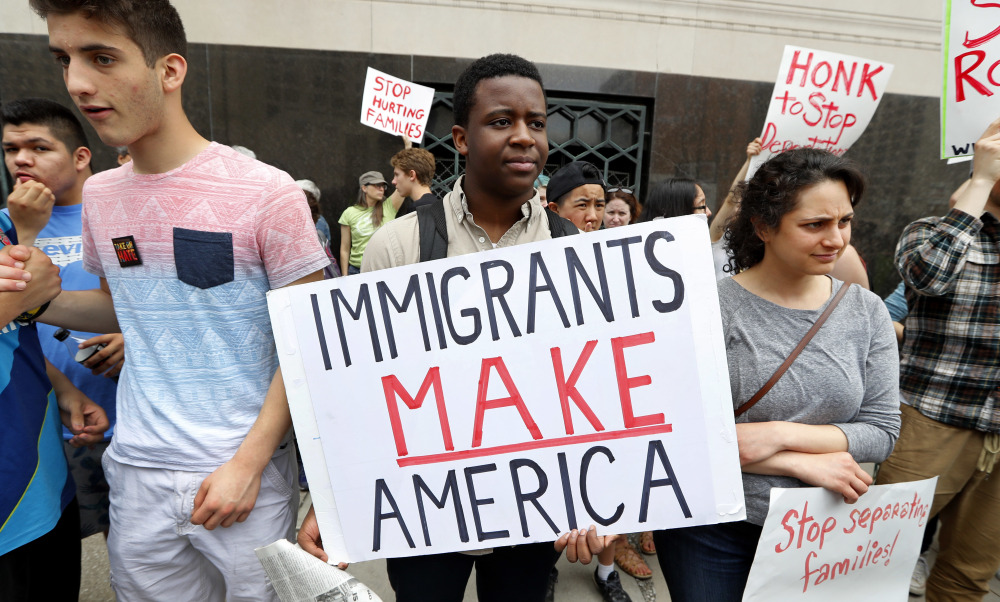Federal immigration agents are arresting more than 400 immigrants a day, a sharp leap from last year that reflects one of President Donald Trump’s most far-reaching campaign promises.
In Trump’s first 100 days in office, U.S. Immigration and Customs Enforcement arrested 41,318 immigrants, up 37.6 percent over the same period last year, the agency said Wednesday. Almost three out of four of those arrested have criminal records, including gang members and fugitives wanted for murder. But the biggest increase by far is among immigrants with no criminal records.
“This administration is fully implementing its mass-deportation agenda,” said Gregory Chen, government relations director for the American Immigration Lawyers Association. “They’re going after people who have lived here for a long time.”
ICE’s announcement showcased one of the Trump administration’s few victories on immigration this year, after federal judges halted parts of his travel ban and sanctuary-city crackdown, and Congress refused his initial requests to fund a border wall.
Advocates for undocumented immigrants say the numbers will add to the fears of longtime, otherwise law-abiding residents who felt spared from deportation under Obama.
Days after Trump took office, he issued an executive order that made clear that anyone in the United States illegally could be deported and ended former President Barack Obama’s policy of frequently granting reprieves from deportation to undocumented immigrants with clean criminal records or U.S.-born children.
Acting ICE Director Thomas Homan said the statistics released Wednesday show that agents still prioritize lawbreakers: 30,473 criminals were arrested from Jan. 22 to April 29, an 18-percent increase from the same period in 2016.
At the same time, arrests of immigrants with no criminal records more than doubled to nearly 11,000, the fastest-growing category by far.
“Will the number of non-criminal arrests and removals increase this year? Absolutely,” Homan said. “That’s enforcing the laws that are on the books.”
What is less clear is what is happening to the immigrants taken into custody.
Overall, deportations have fallen about 12 percent this year, to about 56,315 people, which Homan attributed to a severe backlog in federal immigration courts. He also said it can take longer to deport criminals than those without criminal records, because those in the former category may have additional court proceedings. Trump has called for additional immigration judges and detention space to speed deportations.
Homan did not say how many of the 41,318 people whose arrests were announced Wednesday have been deported, remain in custody or have been released.
Unlike criminal arrests, records of immigration arrests – which are considered civil violations – are not publicly accessible.
The secrecy allows immigration officials to pick and choose which examples of their work to highlight. On Wednesday, they said the immigrants arrested since Trump’s executive order include Estivan Rafael Marques Velasquez, an alleged MS-13 gang member from El Salvador captured in New York in February; Juan Antonio Melchor Molina, a fugitive wanted for a 2008 murder in Mexico who was arrested last month in Dallas; and William Magana-Contreras, another reputed MS-13 member arrested in Houston last month. Magana-Contreras is wanted for aggravated homicide in El Salvador, officials said.
Some advocates questioned whether ICE is truly prioritizing the most serious criminals.
Parastoo Zahedi, an immigration lawyer in Virgina, said ICE is actively trying to deport one of her clients to Italy because of a conviction for a small amount of marijuana. He has lived in the United States nearly all his life.
“It’s not criminal aliens,” Zahedi said. “It’s anyone that they can catch.”
Ava Benach, a District of Columbia immigration lawyer, said ICE agents are “empowered, emboldened and . . . eager to enforce the law aggressively.”
Advocates also questioned the wisdom of arresting thousands of more immigrants – especially those who pose no known public safety threat – when immigration courts are severely backlogged. But Homan said that is the agency’s job.
“When a federal judge makes a decision and issues a deportation order, that order needs to mean something,” he said. “If we don’t take action on those orders, then we’re just spinning our wheels, aren’t we?”
Obama also sharply increased deportations during parts of his tenure, expelling around 400,000 deportees a year during his first six years in office. At the same time, he lobbied Congress to create a path to citizenship for many of the estimated 11 million undocumented immigrants living here.
Send questions/comments to the editors.



Comments are no longer available on this story